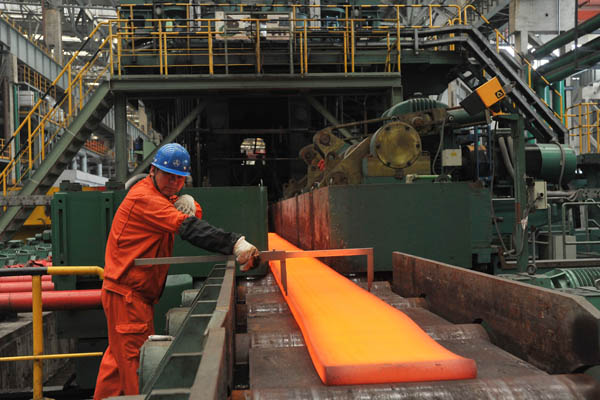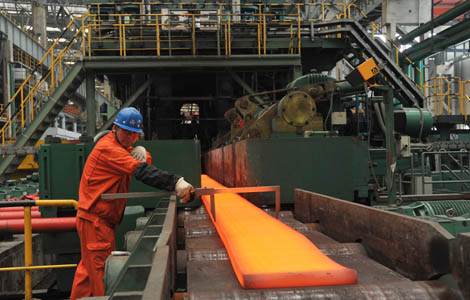19 industries to shed capacity
Updated: 2013-07-27 00:21
By ZHENG YANGPENG (China Daily)
|
||||||||
Move marks the government's determination to cut overcapacity, reform economy
The Ministry of Industry and Information Technology has ordered the closure of many factories in 19 industries where overproduction has led to price-cutting wars, affirming its determination to push ahead with a painful makeover of the economy.
More than 1,400 companies in 19 industries in China were told to cut production capacity, according to a statement by the ministry on Thursday.
 |
|
Some iron and steel mills, one of the 19 industries suffering from overcapacity, will be closed as the country moves to upgrade its industrial structure and the overall economy. LIU DEBIN / FOR CHINA DAILY |
Cement, steelmaking, ferroalloys, electrolytic aluminum, copper smelting, chemical fiber and papermaking are among industries required to cut excess capacity. Papermaking and cement are the two industries that involved the largest number of companies in the latest campaign.
Local governments and companies were ordered to stop production by the end of September. The deadline for elimination was set for the end of this year, the ministry's statement said.
Nineteen public companies were on the list. Shares in BBMG Corp, Inner Mongolia Baotou Steel Rare-Earth Hi-Tech Co and Shandong Chenming Paper Holdings Ltd slid more than 2 percent after they were cited on the list.
The benchmark Shanghai Composite Index slipped 0.51 percent to 2,010.85 on Friday. The SZSE Component Index dropped 0.65 percent to 7,843.36.
"This detailed list shows the government is serious in its efforts to restructure the economy and is prepared to tolerate the necessary pain," Zhang Zhiwei, chief China economist at Nomura Holdings Inc in Hong Kong, wrote in a note. "This reinforces our view that aggressive policy stimulus is unlikely in 2012 and that growth should trend down."
More than 92 million metric tons of excess cement capacity and about 7 million tons of excess steel production capacity are expected to be wiped out under the government's plan, Zhang said.
Several of the listed companies affected released announcements on Friday, declaring the shutting down of listed excess capacity had little effect on their business.
Xinxiang Bailu Chemical Fiber Co Ltd, one of the 19 public companies, said the shutting down of 20,000 tons of viscose capacity, as required by the ministry, had already been decided at an April meeting of the company. Revenue from the viscose capacity only accounted for 7 percent of the company's income. Its share price gained 3.66 percent by the end of trading on Friday.
Shandong Chenming Paper Holdings Ltd said on Friday that among the 284,200 tons of pulp capacity that was ordered to be cut, 220,000 tons belonged to Wuhan Chenming, a subsidiary of the parent company. This capacity had been eliminated by the end of last year and the production line was being dismantled. Other outdated facilities had either been halted or sold to local companies.
Lin Jian, a metallurgy industry analyst with Zheshang Securities Co Ltd, said the shutting down of lead- and copper-smelting capacity was beneficial for these businesses.
"The shutdown will help to reverse the over-supply situation in these industries. From a medium- to long-term perspective, it will stabilize metal prices and improve the profitability of leading companies in these industries," Lin said.
As much as 879,000 tons of lead smelting and 665,000 tons of copper smelting capacity were ordered to be cut, accounting for 19 percent and 11 percent of national capacity, respectively.
The ministry's decision to eliminate excess capacity was accompanied by efforts to foster emerging industries that are considered to be promising in the future.
A ministry news conference on Wednesday said it will strive to boost the demand for information technology and support the battle to fight air pollution.
China aims to boost spending on the IT industry at a rate of more than 20 percent annually through 2013 to 2015, according to a State Council meeting on July 12.

 19 industries to shed capacity
19 industries to shed capacity
 Choir sings its way into Chinese hearts
Choir sings its way into Chinese hearts
 Hot times for travel agents
Hot times for travel agents
 Nursing home blaze kills 11 residents
Nursing home blaze kills 11 residents
 Wuhan a prime spot for international rowing hub
Wuhan a prime spot for international rowing hub
 LeBron frenzy grips Guangzhou
LeBron frenzy grips Guangzhou
 Police to question driver for Spanish train crash
Police to question driver for Spanish train crash
 Top DPRK leader meets Chinese vice-president
Top DPRK leader meets Chinese vice-president
Most Viewed
Editor's Picks

|

|

|

|

|

|
Today's Top News
US, Vietnam discuss trade
Sovereign fund sees 10.6% return
Hot times for travel agents
19 industries to shed capacity
US, Vietnam discuss trade
Russia not to hand over Snowden to US: Kremlin
China, Russia boost ties with joint drills
VP calls for peace during DPRK visit
US Weekly

|

|








